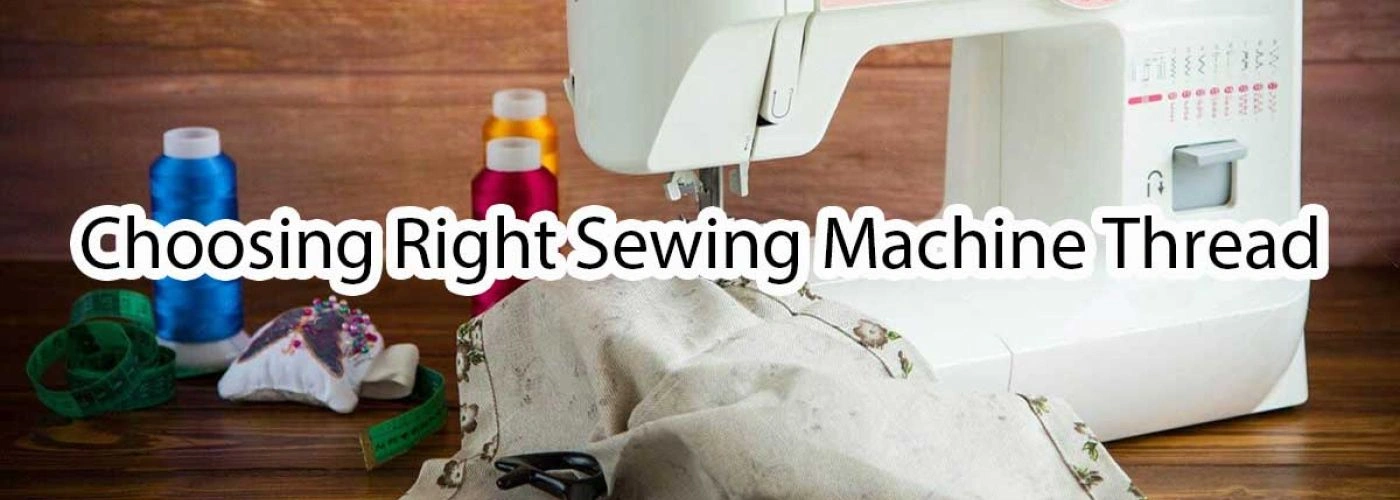
Best Sewing Machine Thread: Choosing the Right Type
Choosing the right sewing machine thread is crucial for any sewing project. This guide will help you understand the different types of sewing machine thread, their specific uses, and how to match thread with fabric for perfect stitches and durability.
Key Takeaways
-
Choosing the right thread type and quality can significantly improve your sewing project’s outcome, preventing issues like thread breakage and uneven stitching.
-
Different threads suit different fabrics; for example, polyester is great for stretchy fabrics, while heavy-duty thread is ideal for thick materials like denim.
-
Investing in high-quality, trusted thread brands ensures smoother sewing experiences and durable results, making it worth the cost in the long run.
Understanding Sewing Machine Thread
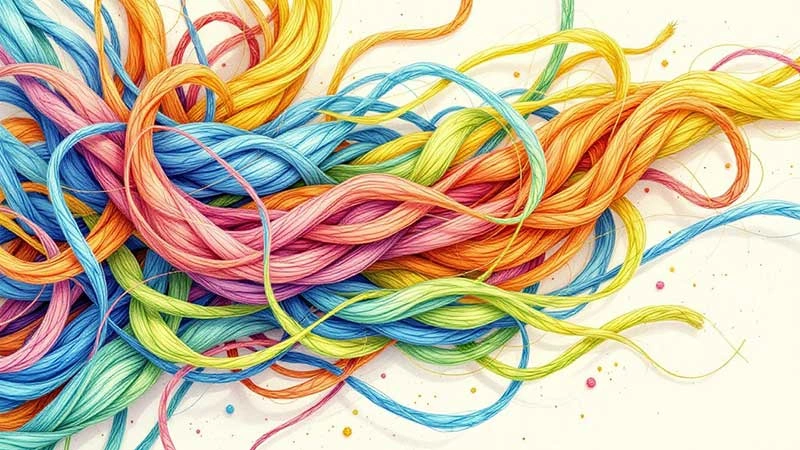
Thread is the unsung hero of any sewing project, standing alongside your sewing machine and fabric as one of the most essential elements. It might be tempting to use an old spool from your stash, but using the correct sewing thread can make all the difference in achieving a smooth, professional finish. Often, we select thread simply by color to match our fabric, but understanding the different types of thread, their compositions, and their specific uses is crucial for achieving that perfect stitch.
Think of this as your thread guide: A general rule of thumb is to use the same type of thread as your fabric. If you’re working with 100% cotton material, use 100% cotton thread and match the thread weight to your fabric. This simple tip can prevent a lot of headaches and ensure that your project holds together beautifully.
Sewing Machine Thread Quality
When it comes to selecting threads, quality matters just as much as type. Investing in good quality thread from well-known brands can save you countless hours of frustration. Poor quality threads, often sold in packs with tempting price tags and a rainbow of colors, can snap easily and cause birds’ nests under your work, leading to uneven stitching and wasted time. Quality thread isn’t necessarily expensive, and it’s a worthwhile investment if it saves you from redoing your work.
Imagine the difference between a smooth, easy sewing experience versus one filled with constant thread breakages and machine jams. High-quality threads ensure consistent tension and smooth operation, making your sewing machine a joy to use rather than a source of frustration.
Types of Sewing Machine Thread
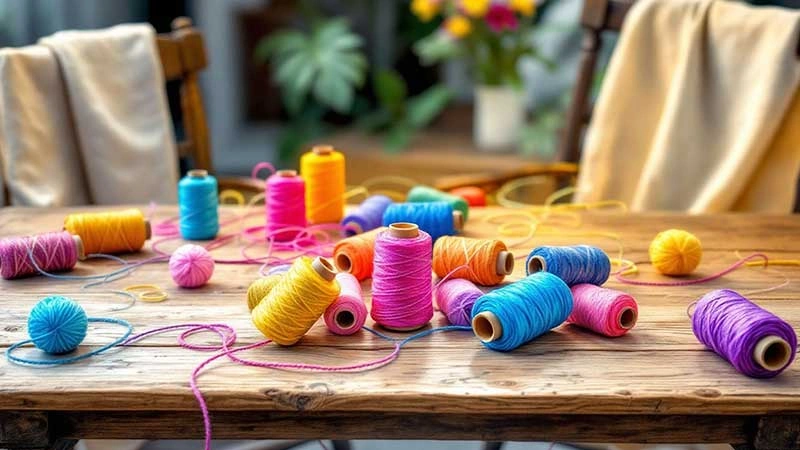
The world of sewing threads is vast, with each type designed for specific purposes. Cotton thread, for example, has very little stretch, making it perfect for delicate projects like sewing with cotton fabrics or sheers. Most cotton threads are mercerized, meaning they have undergone a chemical process to increase their luster and make them more water- and dye-absorbent, ensuring they won’t run in the wash.
Knowing the characteristics of each thread type helps in choosing the right one for your project. From polyester to nylon, each thread has its unique strengths and uses, ensuring that every stitch is strong and durable.
Polyester/Nylon Thread
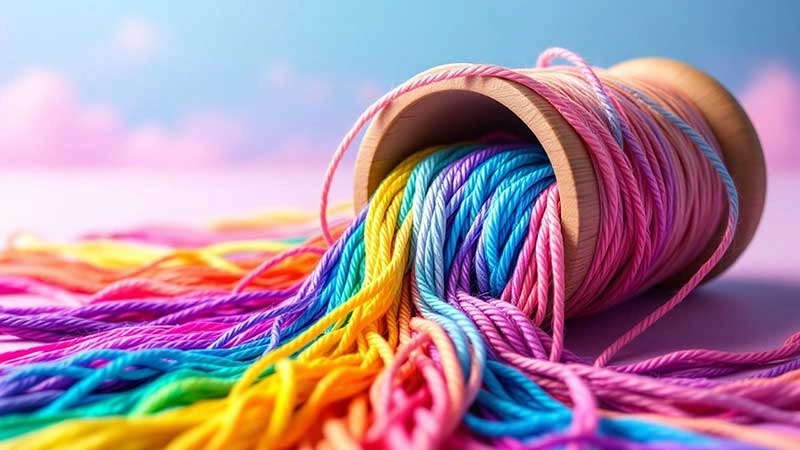
Polyester and nylon threads are the workhorses of the sewing world. These strong threads have a bit of stretch, often finished with wax or silicone to slip through fabric with minimal friction, making them ideal for any kind of sewing pattern. Their versatility extends to stretch fabrics like synthetics and knits, where their elasticity prevents breakages during sewing.
Cotton-wrapped polyester thread is another versatile option, suitable for most fabrics. However, if you plan to dye your garment, remember that polyester thread will not take the dye unless it’s specially formulated for polyester.
For a reliable all-purpose thread, 100% spun polyester is widely available in numerous colors and works well for both machine sewing and hand stitching.
Cotton Thread
Cotton thread has very little stretch and is great for delicate projects, particularly for cotton fabrics or sheers, but not for stretchy fabrics. Most cotton thread is mercerised, which means it has gone through a series of chemical processes that increase the lustre of the thread and make it more water- and dye-absorbent. This means it’s less likely to run in the wash.
Overlock Thread/ Serger Thread
When tackling large projects like quilting patterns, overlock thread, or serger thread is your best friend. These large cones can contain up to 5,000 meters of thread, designed for use on overlockers and industrial machines to reduce the frequency of replacements. If you’re threading an overlocker, you’ll need four cones of thread in the same color, or similar colors if the edges won’t be visible.
For those using overlock cones on a sewing machine, inserting a smaller spool inside the cone can help it fit snugly on the spool holder.
Metallic Thread
For those special occasions that call for a bit of sparkle, metallic thread is your go-to. These glitzy threads are perfect for party garments but require a metallic needle with a larger eye to prevent wear from the metal in the thread.
Sewing with metallic threads can be challenging, so sew slowly to avoid breakages.
Shirring Elastic
Shirring elastic is the secret to creating stretchy, gathered areas on garments, typically across the bust or waist. This type of elastic needs to be wound onto your bobbin by hand to avoid overstretching. It’s perfect for adding comfort and style to your sewing projects.
Clear Thread
Clear thread, also known as invisible thread, blends seamlessly with your fabric, making it ideal for light fabrics or mending. These threads are made from 100% nylon and come in clear and black varieties.
Use clear thread for lighter fabrics and black for darker ones to ensure your stitches remain invisible.
Specialty Threads for Specific Projects
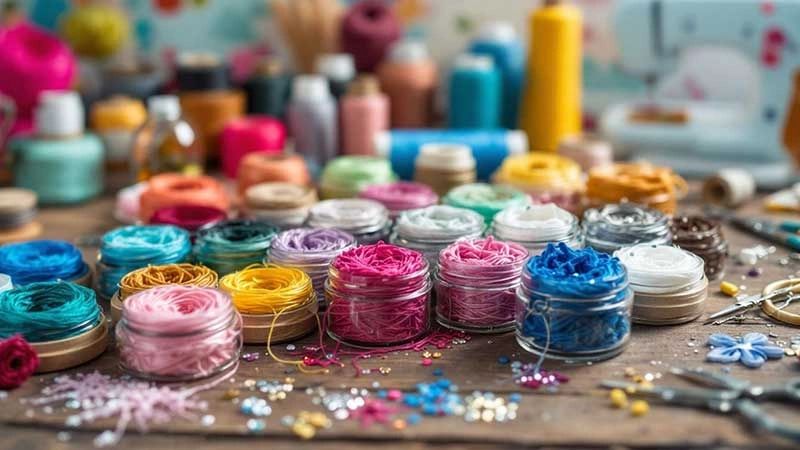
Specialty threads are tailored for unique applications, ensuring your projects are both functional and beautiful. From natural fibers like cotton to synthetic options like polyester and nylon, each type offers distinct advantages. Selecting the right thread for your specific project can make all the difference, whether you’re working on crafts, quilts, or garments.
Heavy Duty Thread/High Tenacity Thread
When your project involves thick or heavy materials, heavy-duty thread is your best bet. Constructed to withstand significant stress, this thread is perfect for items like luggage, upholstery, and outdoor gear. Using heavy-duty thread reduces the risk of seam breakage, ensuring your projects hold up under pressure.
Bonded Thread
Bonded thread is a staple in industrial manufacturing, valued for its reliability and efficiency in applications such as filtration, geotextiles, and industrial upholstery. Its durable construction and specialized coating make it a superior choice for demanding environments.
The protective coating on bonded thread enhances its resistance to UV exposure, fading, and chemical damage, ensuring long-term performance even in harsh conditions. This makes it an excellent option for projects requiring durability under environmental stress.
Nylon thread, known for its exceptional elasticity and strength, is particularly well-suited for tasks involving frequent tension. When combined with the bonded thread’s coating, it offers enhanced durability and minimizes the risk of unraveling, even under high stress.
From high-speed sewing to heavy-duty applications, bonded thread delivers versatility and reliability. Its durability and specialized features make it an ideal choice for a wide range of projects, offering both modern solutions and compatibility with traditional thread varieties.
Choosing the Right Thread for Your Fabric
Matching the right thread to your fabric is crucial for achieving the best results. Cotton thread is soft and breathable, ideal for lightweight projects, while polyester thread is known for its strength and elasticity, making it suitable for heavier applications. All-purpose thread offers a balance of strength and flexibility, making it a versatile choice for various fabrics.
The weight of the thread also plays a significant role in the success of your sewing projects.
Thread for Knits
When working with knit fabrics, polyester thread is often recommended due to its strength and slight stretch, which prevents breakage during sewing.
Wooly nylon thread is particularly well-suited for knits because of its extra stretch, making it perfect for seams that require movement.
Thread for Jeans
For sewing denim, nothing beats heavy-duty thread. It ensures durability and can withstand the strain of thick fabrics. When topstitching denim, using a thicker thread enhances the durability and visual appeal of the seams, making your jeans look professionally finished.
Thread Weight and Size
Thread weight and size are critical factors in sewing. Selecting the appropriate thread enhances the strength and appearance of seams, reducing issues such as fraying or snapping.
Matching the thread to the fabric type ensures optimal performance and finish.
-
English Count (Ne) = Number of hanks of 840 yards/lb
-
Metric Count (Nm) = Number of hanks of 1000 metres/kg
-
Tex (T) = Weight in grams of 1,000 metres
-
Denier Count (Td or d)=Weight in grams of 9,000 metres
Understanding Thread Weight
Thread weight is another method to determine thread size, and it’s actually a length measurement. A smaller weight number indicates a heavier thread. For instance, a thread labeled as 40 wt. means that 40 kilometers of that thread weigh 1 kilogram. Conversely, a 30 wt. thread is heavier because it takes only 30 kilometers of thread to weigh the same.
Understanding this can help you choose the right thread for your project’s requirements, whether you need a delicate thread for fine fabrics or a heavier thread for something more robust.
Different Sizes of Thread
Thread sizes vary from ultra-thin to heavyweight, impacting seam strength, stitch visibility, and the type of needle required for sewing. Larger denier numbers correspond to heavier threads, influencing the overall sewing experience.
Choosing the appropriate thread size based on the fabric and the desired outcome is crucial for achieving the best results in your sewing projects.
Navigating between different thread sizing systems can be challenging, but a thread size conversion chart can simplify this process. For example, converting between weight and denier can be done using the formula: Denier = 9000/weight. Similarly, to convert weight to Tex, you can use the formula: Tex = 1000/weight. These conversions are crucial when you’re working with threads from different regions or manufacturers.
-
Weight to Denier 9000/weight
-
Weight to Tex 1000/weight
-
Denier to Weight 9000/denier
-
Denier to Tex denier x 0.111
-
Tex to Denier tex x 9
-
Tex to Weight 1000/tex
-
40 weight = 225 denier = Tex 25
Quality Matters: Good Quality Thread vs. Cheap Thread
Investing in good quality thread is essential for maintaining consistent sewing quality and preventing problems that arise from inferior materials. High-quality threads have longer fibers and are smoother, while low-quality threads tend to have shorter fibers and a fuzzy texture. Quality threads exhibit higher tensile strength, reducing the risk of breakage during sewing, compared to cheaper options that may tear more easily. The elongation of quality thread enhances seam elasticity, resulting in better overall sewability, unlike cheap threads that may lack this feature.
Abrasion resistance is significantly better in high-quality threads, making them more suitable for durable projects that withstand wear and tear. Consistent diameter in quality threads ensures smoother sewing performance, while cheap threads often have irregularities that can lead to stitching problems.
Investing in quality thread can lead to better overall sewing results, minimizing issues like skipped stitches and thread breakage.
Thread Brands You Can Trust
When it comes to sewing threads, some brands stand out for their reliability and quality. Gutermann, for instance, is renowned for its durability and extensive color selection, making it a favorite among sewists. Their Sew-All Thread and Top Stitch Thread are particularly popular.
Amann, another top-quality brand, is known for its high standards, alongside well-known names like Coats & Clark and other brands. Coats & Clark offers affordable and widely accessible threads, with options like Dual Duty XP and Trilobal Polyester being highly regarded.
Other reputable brands include Maxi-Lock, recognized for its reliable sewing threads, and Mettler, known for its innovative and versatile products like Metrosene and Silk Finish Cotton. Superior Threads and Madeira are also celebrated for their high-tensile strength and precision in embroidery threads, respectively.
Choosing high-quality threads from these trusted brands significantly enhances the durability and appearance of your finished sewing projects.
Choosing the right sewing machine thread is important
Selecting the appropriate thread is crucial as it directly affects the outcome of your sewing project, influencing both appearance and durability. Using a thread that matches the fabric type ensures that the stitches hold up and look consistent, preventing issues like puckering or breaking. Higher quality threads run more smoothly through the sewing machine, reducing the likelihood of jams and skipped stitches.
It’s advisable to test the thread and needle combination on scrap fabric before starting a project to ensure compatibility. Matching the thread thickness with the fabric weight is essential; heavier fabrics require thicker threads for effective seam strength.
Maintaining Your Sewing Machine with the Right Thread
Maintaining your sewing machine is essential, and using the right thread can help prevent sewing issues. Most sewing machines require adjustments to tension when switching between different thread sizes to maintain optimal stitching performance. Using cheaper threads can require adjusting the tension settings on your sewing machine and may result in lint buildup, potentially leading to tension issues.
Storing quality thread properly contributes to its longevity and performance, whereas cheaper threads may degrade faster if not stored correctly. Regular maintenance of your sewing machine should include cleaning and oiling every few months, especially if using lint-prone threads like cotton.
Regular cleaning of your sewing machine, especially around the bobbin case, reduces issues caused by lint buildup.
Summary
Choosing the right thread for your sewing projects is a critical step that can significantly impact the quality and durability of your finished product. By understanding the types of threads available, their qualities, and how to match them to your fabric, you can ensure that your sewing projects are not only beautiful but also long-lasting. Whether you’re working with delicate cotton, sturdy denim, or stretchy knits, the right thread makes all the difference. Remember, investing in good quality thread from trusted brands pays off in the long run, saving you time and frustration. Happy sewing!
Frequently Asked Questions
- Why is it important to use good quality thread?
Using good quality thread is crucial because it leads to smoother sewing, fewer breakages, and overall better durability and appearance of your projects. You want your creations to last and look great, right? - What type of thread should I use for sewing denim?
- You should use a heavy-duty polyester thread for sewing denim since it’s strong enough to handle the thickness and strain of the fabric. Trust me, you'll thank yourself later!
- Can I use cotton thread on synthetic fabrics?
- You can use cotton thread on synthetic fabrics, but polyester thread is usually better since it's stronger and more elastic. Stick with polyester for the best results!
- How do I choose the right thread for knit fabrics?
- For knit fabrics, go with polyester thread for its strength and light stretch, or opt for wooly nylon if you need extra stretch in your seams. It's all about ensuring your seams can move with the fabric!
- What are some trusted brands for sewing threads?
- When it comes to sewing threads, you can’t go wrong with brands like Gutermann, Coats & Clark, and Mettler. They’re known for their quality and reliability!
Other Related Topics
- Sewing with Thick Thread on Sewing Machines
- The Ultimate Guide to Sewing Thread Kits for Machines
- Best Thread for Babylock Sewing Machines: Stitching Success
- What Holds the Bottom Thread on a Sewing Machine?
- Best Serger Thread Cones: Threading the Needle on Serging Success
- Master the Stitch: Choosing the Right Threads for Your Singer
 Whatsapp:
Whatsapp: